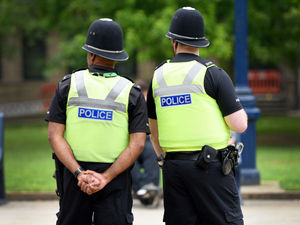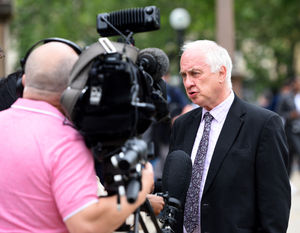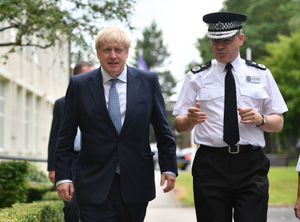Black people in West Midlands four times as likely to be stopped by police
The situation was described as ‘unacceptable’ by the region’s police and crime commissioner.

Police chiefs in the West Midlands have said the use of force in stop and search is "disproportionate" towards the black community and "needs to change".
David Jamieson, the region's Police and Crime Commissioner, said rates had improved by the force but they were still "unsatisfactory".
It comes as figures, based on a census from 2011, shows a black person is almost four times more likely to be stopped than a white person.
Concerns about racism have triggered demonstrations around the world, including the UK, following the death of George Floyd in the United States after his restraint by police officers.
West Midlands Police plan to recruit 1,000 new officers from Black, Asian, and Minority Ethnic (BAME) communities.
The force currently counts 10.9 per cent of its officers from BAME communities.
Mr Jamieson said: "Force is necessary for police officers to use on occasion – it's to keep us safe and it can take many forms.

"But we have to make sure they are used proportionately and properly and there must be very close scrutiny of these powers.
"I'm hoping we can rebuild that trust with our black communities and there's a lot of work do be done.
"I want to ensure the force recruits 1,000 officers from BAME communities so it looks more like the communities it serves.
"For those new recruits and the wider public to have confidence in the force we are trying to build we need to make meaningful progress on the disproportionate rates of stop and searches and use of force.
"I hope this honest and open debate in public about what we need to do acts as an important first step."
The powers are also disproportionate when assessing age and gender – with 63 per cent of people aged between 18-34, with 87 per cent of those stopped being male.
Assistant Chief Constable Vanessa Jardine said the force used powers in areas where crime levels are high – with the same areas suffering from inequality.

The targeted areas suffer from lower employment levels and household incomes – with a higher proportion of BAME people.
She said: "The way our use of force is used on minority communities impacts on our police legitimacy.
"The powers are there to be used legally and fairly and if we find a power is being used disparatively we need to make sure it's not being exercised through bias.
"What we need to do as an organisation is to really understand this data and accept there's future work to be done to understand this disproportionally.
"And most importantly we need our communities to work with us to help us improve that trust."
Data showed a total of 11,064 stop and searches were carried out between January 1 and May 31, a meeting of the PCC's monthly strategic policing and crime board heard.
Figures also showed only 26.9 per cent of searches resulted in a "positive" outcome – with 1,512 arrests and 266 knives being recovered.
The report concluded officers' cameras were used in just over three quarters of documented use of force incidents, and about two-thirds of stop and searches.

Chief Constable Dave Thompson said: "It will never be 100 per cent because there will be occasions when there are extenuating circumstances.
"Stop-search I am more concerned about.
"This enables us to shine a light in some teams now, to say 'you just don't seem to turn your body-cam on when you do a search?'
"I think that is poor practice evidentially, let alone poor practice in terms of future relations and trust, so we definitely need to do more work in that area."
Mr Thompson said the body-cams allowed the independent watchdog – the Independent Office for Police Conduct – to properly analyse the situation.
"Some cases can look problematic to some communities – I'm sure you may have seen the footage on social media surrounding the incident in Sandwell," he told the meeting.
"When all the videos have been seen and reviewed the IOPC determined there was a reasonable use of force."





